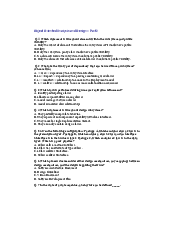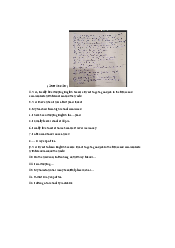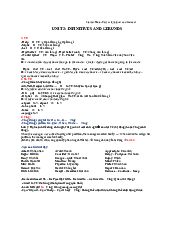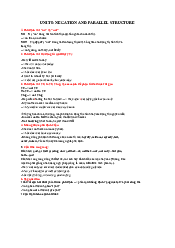





Preview text:
PRACTICE TEST 12.37
Read the following passage and mark the letter A, B, C, or D on your answer sheet to indicate
the correct answer to each of the questions from 1 to 5.
Some doctors think that you should drink a glass of water each morning. You should drink
this water first thing, before doing anything else. The temperature of the water should be similar
to body temperature; neither too hot nor too cold. If you drink a glass of water which is too cold,
it can cause an imbalance to the body and slow down the digestive process. Besides, drinking too
hot water can bring about some serious side effects such as extensive damage to the tissue and other organs.
Why should you drink this water? Water helps your body in many ways. It helps clean out
your kidneys. It prepares your stomach for digestion. Water can also help your intestines work
better. After drinking water, the intestines can more easily take out nutrients from our food.
Water also helps US go to the bathroom more easily.
Scientists suggest that people take in 1,600 milliliters of water each day. But don't drink all of
that water in one sitting. If you do, your kidneys will have to work much harder to eliminate it.
It's better to drink some in the morning and some in the afternoon. Some people think it's better
to drink between meals and not during meals. They think water dilutes the juices produced in our
stomachs. This can interfere with normal digestion. Are you drinking enough water every day?
Check the color of your urine. If it is light yellow, you are probably drinking enough. If your
urine is very dark yellow, you probably need to drink more water. A little more water each day could make you much healthier.
(Adapted from Reading Challenge 1 by Casey Malareher and Andrea Janzen)
Question 1: What is the main idea of the passage?
A. How to drink water correctly?
B. The importance of water
C. The advice of the doctors
D. The best amount of water to drink
Question 2: The word "which" in paragraph 1 refers to__________. A. water B. a glass of water C. water temperature D. body temperature
Question 3: According to the passage, water is good for the following organs of the body, EXCEPT __________. A. kidneys B. stomach C. livers D. intestines
Question 4: The word "eliminate" in paragraph 3 is closest in meaning to___________. A. process B. preserve C. remove D. absorb
Question 5: Which of the following is NOT true?
A. You need to drink more water if your urine is light yellow.
B. Drinking water while having meals may interfere with normal digestion.
C. You shouldn't drink too much water at the same time.
D. The first thing you should do every morning is to drink water.
Mark the letter A, B, C, or D on your answer sheet to indicate the correct answer to each of
the following questions from 6 to 20.
Question 6: Meghan Markle, became a member of British Royal Family upon her_________to
Prince Harry on May 19th, 2018, is an American actress and humanitarian. A. married B. marrying C. marriage D. marry 1
Question 7: She finally achieved her_____of visiting the USA. A. desires B. objective C. target D. ambition
Question 8: __________every major judo title, Mark retired from international competition. A. Having won B. On winning C. When he won D.Winning
Question 9: __________his employees will have worked for two hours.
A. By the time the boss arrives
B. When the boss arrives
C. Only when the boss arrives
D. After the boss arrives
Question 10: Drinking too much alcohol is said to ________ harm to our health. A. make B. lead C. do D. take
Question 11: Governments decided to take __________ measures to deal with terrorism. A. threshing B. tough C. enormous D. profound
Question 12: Helen has just bought _____________ scarves. A. wool black new B. new wool black C. black wool new D. new black wool
Question 13: The escaped prisoner fought before he was finally overpowered. A. head over heels B. heart and soul C. tooth and nail D. foot and mouth
Question 14: __________ I've cleaned it and polished it, it still doesn't look new. A. Because B. Although C. While D. In spite of
Question 15: Everyone hopes to gain physical health,_____________? A. doesn't she B. don't they C. doesn't he D. do they
Question 16: We _______to the hospital to visit Mike when he _______to say that he was fine. A. drove - called
B. were driving - was calling
C. were driving - called D. drove - was calling
Question 17: What chemical is this? It's_________a horrible smell. A. giving off B. giving over C. giving down D. giving up
Question 18: Is he capable______doing such a hard job? A. in B. of C. for D. with
Question 19: Today, many serious childhood diseases______by early immunization. A. can be prevented B. prevent C. are preventing D. can prevent
Question 20: The more you practice speaking in public,__________.
A. the greater confidence you become
B. the more you become confidently
C. the more you become confident
D. the more confident you become
Mark the letter A, B, C, or D on your answer sheet to indicate the word(s) CLOSEST in
meaning to the underlined word in each of the following questions from 21 to 22.
Question 21: There must be a mutual trust between friends. A. belief B. suspicion C. defendant D. reliance
Question 22: He seems to make the same mistake over and over again A. repeatedly B. in vain C. by the way D. for good 2
Read the following passage and mark the letter A, B, C, or D on your answer sheet to indicate
the correct word or phrase that best fits each of the numbered blanks from 23 to 27.
Father's Day was created to complement Mother's Day. Like Mother's Day (23)_____honors
mothers and motherhood, Father's Day celebrates fatherhood and paternal bonds; it highlights
the (24) ________ of fathers in society. Many countries celebrate it on the third Sunday of June,
but it is also celebrated widely on other days. Historically, Sonora Smart Dodd was the woman
behind the celebration of male parenting. Her father, the Civil War veteran William Jackson
Smart, was a single parent who (25) _______ his six children there. After hearing a sermon
about Jarvis' Mother's Day in 1909, she told her pastor that fathers should have a similar holiday
honoring them. Although she initially suggested June 5, her father's birthday, the pastors did not
have enough time to prepare their sermons, and the celebration was deferred to the third Sunday
of June. The first celebration was in Spokane. Washington at the YMCA Young Men's Christian
Association) on June 19, 1910. Since then it has become a traditional day (26) _________year.
In recognition of what fathers do for their families, on this day people may have a party
celebrating male parenting or simply make a phone call or send a greeting card. (27)_____,
schools help children prepare handmade gifts for their fathers many days before the celebration. Question 23: A. who B. where C. when D. which
Question 24: A. impact B. influence C. conquest D. effect
Question 25: A. made B. raised C. took D. realized
Question 26: A. another B. any C. other D. every
Question 27: A. However B. Then C. Besides D. In contrast
Mark the letter A, B, C, or D on your answer sheet to indicate the under in each of the
following questions from 28 to 30.
Question 28: The boy has a lot of toy cars, but he never plays with it. A. but B. never C. has D. it
Question 29: They have carried out exhausting research into the effects of smartphones on
schoolchildren's behaviour and their academic performance. A. into
B. academic performance C. behaviour D. exhausting
Question 30: He begins to study English three years ago. A. to study B. three years C. English D. begins
Mark the letter A, B, C, or D on your answer sheet to indicate the word whose underlined part
differs from the other three in pronunciation in each of the following questions from 31 to 32. Question 31: A. false B. laugh C. after D. glass Question 32: A. removed B. rained C. washed D. changed
Mark the letter A, B, C, or D on your answer sheet to indicate the sentence that best combines
each pair of sentences in the following questions from 33 to 34.
Question 33: I didn't invite her to the party. I'm really sorry now.
A. As long as his parents are at home, they will be able to help him.
B. If only I had been sorry and could have invited her to the party.
C. I really wish I had invited her to the party.
D. If I were you, I had invited her to the party. 3
Question 34: They finished one project. They started working on the next.
A. Hardly had they finished one project when they started working on the next.
B. Only if they had finished one project did they start working on the next.
C. Had they finished one project, they would have started working on the next.
D. Not until did they start working on the next project then they finished one.
Mark the letter Ay By Cy or D on your answer sheet to indicate the word that differs from the
other three in the position of stress in each of the following questions from 35 to 36. Question 35: A. verbal B. common C. social D. polite
Question 36: A. intellectual B. unexpected C. dedicated D. pessimistic
Mark the letter Ay By Cy or D on your answer sheet to indicate the sentence that is closest in
meaning to each of the following questions from 37 to 39.
Question 37: "What are you going to do after school, Anne?" Kevin asked.
A. Kevin asked Anne what was she going to do after school.
B. Kevin asked Anne what she was going to do after school.
C. Kevin wanted to know what would Anne do after school.
D. Kevin wanted to know what Anne would do after school.
Question 38: The last time I went swimming was when we were in Spain.
A. I used to go swimming when I visited Spain.
B. I have not gone swimming since we were in Spain.
C. We often went swimming together when we were in Spain.
D. I always went swimming when we were in Spain.
Question 39: Sally paid for her travel in advance, but it wasn't necessary.
A. Sally couldn’t have paid for her travel in advance.
B. Sally may not have paid for her travel in advance.
C. Sally needn't have paid for her travel in advance.
D. Sally might not have paid for her travel in advance.
Mark the letter Ay By Cy or D on your answer sheet to indicate the sentence that best
completes each of the following exchanges from 40 to 41.
Question 40: Jenny and Jimmy are talking about university education.
- Jenny: “I think having a university degree is the only way to succeed in life.”
- Jimmy: “_______. There were successful people without a degree.” A. I don't quite agree. B. That's life. C. I can't agree more. D. That's all right.
Question 41: Lien was walking her dogs in the park, she met Lan accidentally.
- Lan: “How lovely your pets are!”
- Lien: “__________.” A. I love them, too
B. Can you say that again C. Really? They are
D. Thank you, it's nice of you to say so 4
Read the following passage and mark the letter A, B, C, or D on your answer sheet to indicate
the correct answer to each of the questions from 42 to 48.
Culture is a word in common use with complex meanings, and is derived, like the term
broadcasting, from the treatment and care of the soil and of what grows on it. It is directly
related to cultivation and the adjectives cultural and cultured are part of the same verbal
complex. A person of culture has identifiable attributes, among them a knowledge of and interest
in the arts, literature, and music. Yet the word culture does
not refer solely to such knowledge
and interest nor, indeed, to education. At least from the 19th century onwards, under the
influence of anthropologists and sociologists, the word culture has come to be used generally
both in the singular and the plural (cultures) to refer to a whole way of life of people, including
their customs, laws, conventions, and values.
Distinctions have consequently been drawn between primitive and advanced culture and
cultures, between elite and popular culture, between popular and mass culture, and most recently
between national and global cultures. Distinctions have been drawn too between culture and
civilization; the latter is a word derived not, like culture or agriculture, from the soil, but from
the city. The two words are sometimes treated as synonymous. Yet this is misleading. While
civilization and barbarism are pitted against each other in what seems to be a perpetual
behavioural pattern, the use of the word culture has been strongly influenced by conceptions of
evolution in the 19th century and of development in the 20th century. Cultures evolve or
develop. They are not static. They have twists and turns. Styles change. So do fashions. There
are cultural processes. What, for example, the word cultured means has changed substantially
since the study of classical (that is, Greek and Roman) literature, philosophy, and history ceased
in the 20th century to be central to school and university education. No single alternative focus
emerged, although with computers has come electronic culture, affecting kinds of study, and
most recently digital culture. As cultures express themselves in new forms not everything gets better or more civilized.
The multiplicity of meanings attached to the word made and will make it difficult to define.
There is no single, unproblematic definition, although many attempts have been made to
establish one. The only non-problematic definitions go back to agricultural meaning (for
example, cereal culture or strawberry culture) and medical meaning (for example, bacterial
culture or penicillin culture). Since in anthropology and sociology we also acknowledge culture
clashes, culture shock, and counter-culture, the range of reference is extremely wide.
Question 42: According to the passage, the word culture ___________.
A. comes from a source that has not been identified.
B. is related to the preparation and use of land for farming
C. derives from the same root as civilization does
D. develops from Greek and Roman literature and history
Question 43: It is stated in paragraph 1 that a cultured person _________.
A. has a job related to cultivation
B. does a job relevant to education
C. takes care of the soil and what grows on it
D. has knowledge of arts, literature, and music
Question 44: The author remarks that culture and civilization are the two words that ________.
A. have nearly the same meaning
B. share the same word formation pattern
C. are both related to agriculture and cultivation 5
D. do not develop from the same meaning
Question 45: It can be inferred from the passage that since the 20th century________.
A. schools and universities have not taught classical literature, philosophy, and history
B. all schools and universities have taught classical literature, philosophy, and history
C. classical literature, philosophy, and history have been considered as core subjects
D. classical literature, philosophy, and history have not been taught as core subjects
Question 46: The word "it" in paragraph 1 refers to__________. A. treatment B. culture C. soil D. meanings
Question 47: The word "static" in paragraph 2 could best be replaced by “__________ A. dense B. unchanged C. balanced D. regular
Question 48: Which of the following is NOT stated in the passage?
A. Anthropology and sociology have tried to limit the references to culture.
B. The use of the word culture has been changed since the 19th century.
C. Distinctions have been drawn between culture and civilization.
D. The word culture can be used to refer to a whole way of life of people.
Mark the letter A, B, C, or D on your answer sheet to indicate the word(s) OPPOSITE in
meaning to the underlined word(s) in each of the following questions from 49 to 50.
Question 49: This tapestry has a very complicated pattern. A. obsolete B. ultimate C. simple D. intricate
Question 50: You're 25 years old, but you still haven't cut the apron strings. A. relied on others B. bought a new house C. started doing well D. become independent 6



